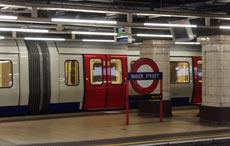Why Gerry Rafferty's Baker Street is the perfect pop song
 Every time I pass through Baker Street on the tube, a saxophone line unfurls inside my head and I find myself humming “Winding your way down to Baker Street …”. The song is lodged inside me, and it only takes a little trigger to set it off, a map reference, an overheard phrase. “Another year and then you’ll be happy … but you’re crying, you’re crying now …”
Every time I pass through Baker Street on the tube, a saxophone line unfurls inside my head and I find myself humming “Winding your way down to Baker Street …”. The song is lodged inside me, and it only takes a little trigger to set it off, a map reference, an overheard phrase. “Another year and then you’ll be happy … but you’re crying, you’re crying now …”
Beautiful and bittersweet, luxuriously textured, with a gentle melancholic verse melody counterweighted by a lusciously explosive instrumental chorus, it's one of those rare songs that everyone responds to. When it was first released in 1978, it became so inescapably ubiquitous that it almost lost its soul, becoming a kind of background music to a whole era. But there is nothing bland or generic about Gerry Rafferty’s Baker Street. It stood in almost direct contrast to the new wave rock energy of the time but it is a song with a powerful, yearning core, where music and lyric perfectly wrap around each other to unfailingly stir emotion. It’s a song full of paradoxes, a gentle reminiscence of the hardness of city life whose beauty makes it a paean to the city itself, it’s got a pessimistic vision of inbuilt failure somehow imbued with the optimism of an escapist dream. It was, really, the story of Rafferty’s own life.
How do we celebrate the work of Rafferty? He was, in many ways, an underachiever, a belligerent alcoholic whose work went into sharp decline with his health. My own parents used to go and see him play Scottish pubs with his folk outfit The Humblebums in the 60s, although they were chiefly drawn by his bandmate Billy Connolly’s humour. Rafferty was also the man behind Stealers Wheel’s delightfully sharp edged 1973 folk pop hit Stuck In The Middle With You, itself embedded in pop culture via Quentin Tarantino’s juxtaposition of its jaunty, uptempo groove with the torture sequence of Reservoir Dogs, perhaps not the kindest of associations. But Rafferty is chiefly, indeed almost exclusively remembered for one song that sounds like the work of an absolute master.
Despite some strong albums and a smattering of minor follow up hits in the late 70s (I have a personal fondness for Get It Right The Next Time), he never hit such stellar heights again. His increasingly rare work in the 80s and 90s saw a marked decline in standards, the highlight probably being his production of the Proclaimers 1987 classic Letter To America.
And yet to have written even one song that so completely captured a moment and utterly embedded itself in the consciousness of the world is more than most musicians ever achieve, or can even hope to achieve. Baker Street is Rafferty’s claim to immortality, and, without delving into his difficult childhood as the son of a violent alcoholic, it tells us everything we need to know about why his life unfolded in the way it did. The characters he addresses are all versions of himself, caught between town and country, despair and hope, drunken nights and regretful mornings: “He's got this dream about buyin' some land / He's gonna give up the booze and the one night stands / And then he'll settle down, there's a quiet little town / And forget about everything …”
That’s the dream. Here is the wistful acceptance of his own reality: “But you know he’ll always keep moving / You know he’s never going to stop moving / Cause he’s rolling / He’s a rolling stone …”
And there, perhaps, is the reason the song resonates so powerfully with everyone who hears it. Because there is surely nothing more human than the triumph of hope over experience. And it plays on in my head and my heart as I rattle down the Bakerloo line, with that beautiful guitar solo shooting like fireworks and the tenor saxophone weeping.
RIP Gerry Rafferty.

